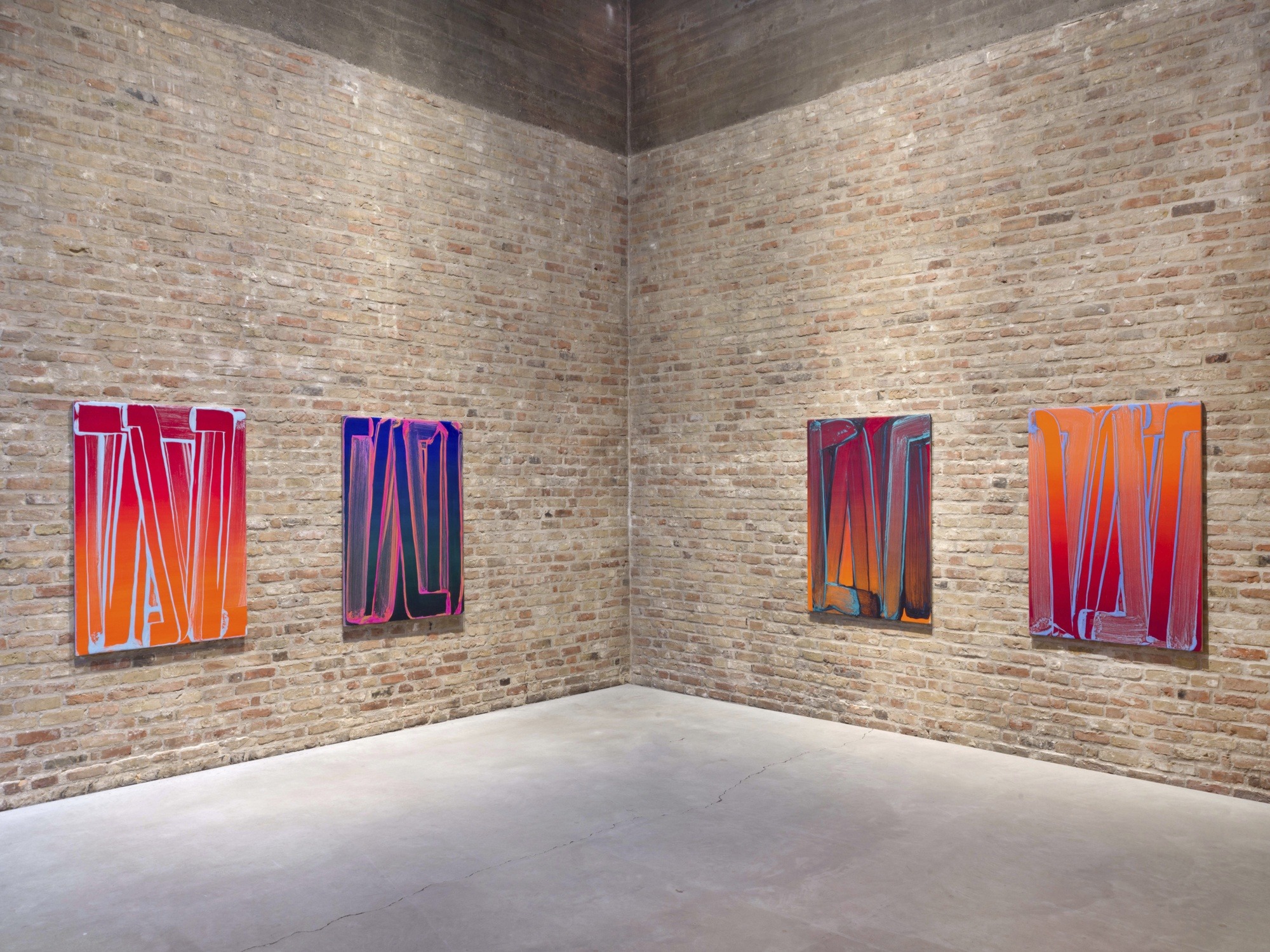Robert Janitz
<3 is a Typo
15 Jan - 16 Feb 2020
ROBERT JANITZ
<3 is a Typo
15 January – 16 February 2020
KÖNIG GALERIE is pleased to announce <3 is a Typo, a site-specific installation of new paintings and sculptures by New York-based artist Robert Janitz. The exhibition will be held in the chapel of KÖNIG GALERIE.
One could describe the work of Robert Janitz as a study of the genealogy of labour. The artist applies paint as a worker would slather a tile with grout. Faced with such constraints, the bored worker may begin to articulate her trowel strokes while still covering the tile’s surface. As generations pass, the gene tires of coding simple protein structures in favour of ornate skeletons. The spreading of paint often takes on a bonelike form — an illustration, perhaps, of the ideal form that the gene pursues.
All of the compositions in <3 is a Typo indicate language: like the primordial bivalve, early written language consisted of various linear structures; as the language organism develops, it gains the curvature, density and asymmetry of a more advanced life-form. Janitz’ recent work is distinct in its implied morphemes: tilted strokes allude to the structure of either the Roman alphabet or Devanagari script—the alphasyllabary used in Sanskrit, of which Janitz is a scholar — but are muffled and garbled by the constraints of the canvas.
Much of Janitz’ newest work concerns what is lost in the creative process. Janitz cites Goethe’s close study of the Abhigyanshakuntalam by the Sanskrit poet Kalidas as a driving influence of the new paintings. Goethe could not read Sanskrit, and his devotion to Kalidas’ work depended entirely on translations of the arcane ancient language. Undoubtedly much of the original nuance of the work was lost as it entered the continental discourse, which only enhances its enigmatic qualities. Much too is lost in the making of Janitz’ paintings — the artist describes traveling forward and backward in time as he removes sections of the wet paint with a rubber spatula. Thus, the painting — as a document — is written, translated, and recoded.
One could imagine all eight paintings spelling out the word L O V E in an unfamiliar language. Using gradated grounds whose overpainted colours are sharply tuned, the message embedded in the composition — however distant — has its own harmony. Elevated above the viewer in this specific context, ecstacy is an intellectual touchstone. Thus, a purpose-built fountain gargles at the centre of the room like an oracle in an oasis. Like the glimmer of a mirage, the corus-cance of the fountain’s water is an illusion: a closer examination reveals a fountain wrought of simple sheet metal sprayed with a chrome coat — a recurring character in Janitz’ predominantly painterly oeuvre. A typo, or "Tippfehler" in German, is a message delivered but not intended. While Janitz’ recent work seems to imply the “<3” of its title, this too may have been distorted in translation.
<3 is a Typo
15 January – 16 February 2020
KÖNIG GALERIE is pleased to announce <3 is a Typo, a site-specific installation of new paintings and sculptures by New York-based artist Robert Janitz. The exhibition will be held in the chapel of KÖNIG GALERIE.
One could describe the work of Robert Janitz as a study of the genealogy of labour. The artist applies paint as a worker would slather a tile with grout. Faced with such constraints, the bored worker may begin to articulate her trowel strokes while still covering the tile’s surface. As generations pass, the gene tires of coding simple protein structures in favour of ornate skeletons. The spreading of paint often takes on a bonelike form — an illustration, perhaps, of the ideal form that the gene pursues.
All of the compositions in <3 is a Typo indicate language: like the primordial bivalve, early written language consisted of various linear structures; as the language organism develops, it gains the curvature, density and asymmetry of a more advanced life-form. Janitz’ recent work is distinct in its implied morphemes: tilted strokes allude to the structure of either the Roman alphabet or Devanagari script—the alphasyllabary used in Sanskrit, of which Janitz is a scholar — but are muffled and garbled by the constraints of the canvas.
Much of Janitz’ newest work concerns what is lost in the creative process. Janitz cites Goethe’s close study of the Abhigyanshakuntalam by the Sanskrit poet Kalidas as a driving influence of the new paintings. Goethe could not read Sanskrit, and his devotion to Kalidas’ work depended entirely on translations of the arcane ancient language. Undoubtedly much of the original nuance of the work was lost as it entered the continental discourse, which only enhances its enigmatic qualities. Much too is lost in the making of Janitz’ paintings — the artist describes traveling forward and backward in time as he removes sections of the wet paint with a rubber spatula. Thus, the painting — as a document — is written, translated, and recoded.
One could imagine all eight paintings spelling out the word L O V E in an unfamiliar language. Using gradated grounds whose overpainted colours are sharply tuned, the message embedded in the composition — however distant — has its own harmony. Elevated above the viewer in this specific context, ecstacy is an intellectual touchstone. Thus, a purpose-built fountain gargles at the centre of the room like an oracle in an oasis. Like the glimmer of a mirage, the corus-cance of the fountain’s water is an illusion: a closer examination reveals a fountain wrought of simple sheet metal sprayed with a chrome coat — a recurring character in Janitz’ predominantly painterly oeuvre. A typo, or "Tippfehler" in German, is a message delivered but not intended. While Janitz’ recent work seems to imply the “<3” of its title, this too may have been distorted in translation.

